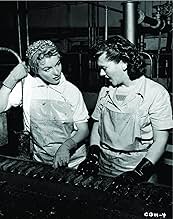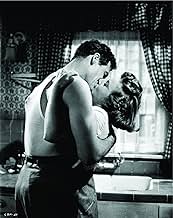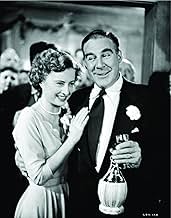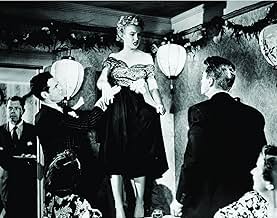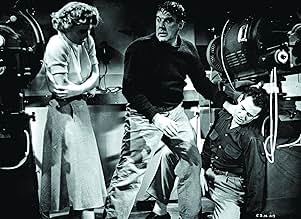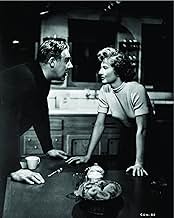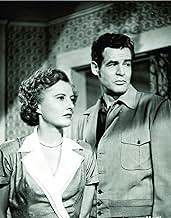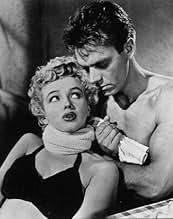Mae Doyle torna nella sua città natale diventata una cinica. Suo fratello Joe teme che la sua amante Peggy finirà come lei. Mae sposa Jerry e ha un bambino: è felice ma nervosa, attratta da ... Leggi tuttoMae Doyle torna nella sua città natale diventata una cinica. Suo fratello Joe teme che la sua amante Peggy finirà come lei. Mae sposa Jerry e ha un bambino: è felice ma nervosa, attratta da Earl, l'amico di Jerry.Mae Doyle torna nella sua città natale diventata una cinica. Suo fratello Joe teme che la sua amante Peggy finirà come lei. Mae sposa Jerry e ha un bambino: è felice ma nervosa, attratta da Earl, l'amico di Jerry.
- Premi
- 3 vittorie totali
William Bailey
- Waiter
- (non citato nei titoli originali)
Harry Baum
- Restaurant Patron
- (non citato nei titoli originali)
Dan Bernaducci
- Guest
- (non citato nei titoli originali)
Albert Cavens
- Restaurant Patron
- (non citato nei titoli originali)
Dick Cherney
- Fisherman
- (non citato nei titoli originali)
Charles Cirillo
- Restaurant Patron
- (non citato nei titoli originali)
Irene Crosby
- Guest
- (non citato nei titoli originali)
Russell Custer
- Fisherman
- (non citato nei titoli originali)
Tony Dante
- Fisherman
- (non citato nei titoli originali)
Roy Darmour
- Man
- (non citato nei titoli originali)
Recensione in evidenza
A hardened woman returns home to a fishing village only to be caught between two men.
At least the movie has Andes and Monroe whose characters come across as refreshingly natural, along with revealing stock footage of the fishing industry. However, the rest of the film is pitched about ten decibels over the top, with all the subtlety of a hammer blow. Douglas's Jerry is not just a nice guy, he's a rub-your-nose-in-it Nice Guy. Similarly for Ryan's cynical Earl and Stanwyck's hard case Mae. Not even such first-rate performers as these can overcome the relentlessly overblown dialog or stagy sets. Nor does it appear the three were allowed to shade their performances beyond one-dimensional caricature. At the same time, the symbolism of roiling seas and surging tide is about as necessary as gravy on soup. In short, the movie amounts to a textbook exercise of heavy-handed histrionics and too much talk, Fritz Lang or no Fritz Lang.
I expect other reviewers are right about the material being shaped for 1950's audiences. In those days, one way of getting people away from TV was to promise them titillation since there was none on TV. But then producers faced the problem of Production Code limits on what could be shown or said on screen, especially in the way of sex. Thus, the emphasis in the film is on the atmospherics of desire instead of anything more literal. This results in a movie that, unfortunately, drowns in an overlay of heavy breathing, standard innuendo, and redundant symbolism. Such may have titillated audiences then; now there's just a dreary sameness in the repetition. At the same time, that turnaround ending shouldn't be overlooked. Unhappily, it's of the same Code-compromised sort that damaged more 50's movies than just this one.
I guess my biggest regret is how the movie takes three of Hollywood's most capable actors and reduces them to near-caricature of their usual screen persona, Douglas and Ryan, especially. Here's hoping they were at least well paid.
At least the movie has Andes and Monroe whose characters come across as refreshingly natural, along with revealing stock footage of the fishing industry. However, the rest of the film is pitched about ten decibels over the top, with all the subtlety of a hammer blow. Douglas's Jerry is not just a nice guy, he's a rub-your-nose-in-it Nice Guy. Similarly for Ryan's cynical Earl and Stanwyck's hard case Mae. Not even such first-rate performers as these can overcome the relentlessly overblown dialog or stagy sets. Nor does it appear the three were allowed to shade their performances beyond one-dimensional caricature. At the same time, the symbolism of roiling seas and surging tide is about as necessary as gravy on soup. In short, the movie amounts to a textbook exercise of heavy-handed histrionics and too much talk, Fritz Lang or no Fritz Lang.
I expect other reviewers are right about the material being shaped for 1950's audiences. In those days, one way of getting people away from TV was to promise them titillation since there was none on TV. But then producers faced the problem of Production Code limits on what could be shown or said on screen, especially in the way of sex. Thus, the emphasis in the film is on the atmospherics of desire instead of anything more literal. This results in a movie that, unfortunately, drowns in an overlay of heavy breathing, standard innuendo, and redundant symbolism. Such may have titillated audiences then; now there's just a dreary sameness in the repetition. At the same time, that turnaround ending shouldn't be overlooked. Unhappily, it's of the same Code-compromised sort that damaged more 50's movies than just this one.
I guess my biggest regret is how the movie takes three of Hollywood's most capable actors and reduces them to near-caricature of their usual screen persona, Douglas and Ryan, especially. Here's hoping they were at least well paid.
- dougdoepke
- 5 ago 2012
- Permalink
Trama
Lo sapevi?
- QuizThis movie was shot while Barbara Stanwyck was in the process of divorcing Robert Taylor. The movie also features the rising young star Marilyn Monroe. Barbara gives a good performance in one of her most memorable films. Despite her emotional devastation due to the divorce, the crew noted Stanwyck's lack of a diva tantrum. Fritz Lang later said, "She's fantastic, unbelievable, and I liked her tremendously. When Marilyn missed her lines - which she did constantly - Barbara never said a word."
- BlooperWhile at the tavern, Mae and Jerry watch the moon rise over the ocean. The film takes place in Monterey, California, which is on the West coast, where the moon rises over the hills and sets on the ocean.
- Curiosità sui creditiand introducing Keith Andes
- ConnessioniEdited into Les Amoureux du cinéma (1987)
- Colonne sonoreI Hear a Rhapsody
Written by George Fragos (uncredited), Jack Baker (uncredited) and Dick Gasparre (uncredited)
Sung by Tony Martin
I più visti
Accedi per valutare e creare un elenco di titoli salvati per ottenere consigli personalizzati
- How long is Clash by Night?Powered by Alexa
Dettagli
Botteghino
- Lordo in tutto il mondo
- 62 USD
- Tempo di esecuzione1 ora 45 minuti
- Colore
- Proporzioni
- 1.37 : 1
Contribuisci a questa pagina
Suggerisci una modifica o aggiungi i contenuti mancanti

Divario superiore
By what name was La confessione della signora Doyle (1952) officially released in India in English?
Rispondi










